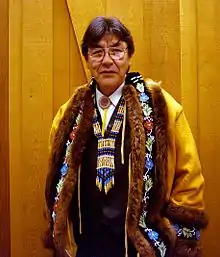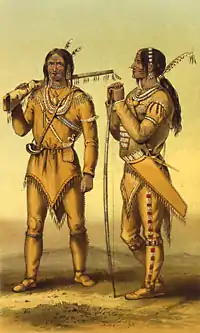Alaskan Athabaskans
The Alaskan Athabascans,[2][3][4][5] Alaskan Athabaskans,[6][7] Alaskan Athapaskans[8] (Russian: атабаски Аляски, атапаски Аляски)[9] are Alaska Native peoples of the Athabaskan-speaking ethnolinguistic group. They are the original inhabitants of the interior of Alaska. In Alaska, where they are the oldest, there are eleven groups identified by the languages they speak. These are the Dena’ina or Tanaina (Ht’ana), Ahtna or Copper River Athabaskan (Hwt’aene), Deg Hit’an or Ingalik (Hitʼan), Holikachuk (Hitʼan), Koyukon (Hut’aane), Upper Kuskokwim or Kolchan (Hwt’ana), Tanana or Lower Tanana (Kokht’ana), Tanacross or Tanana Crossing (Koxt’een), Upper Tanana (Kohtʼiin), Gwich'in or Kutchin (Gwich’in), and Hän (Hwëch’in). The Alaskan Athabascan culture is an inland creek and river fishing (also coastal fishing by only Dena'ina of Cook Inlet) and hunter-gatherer culture. The Alaskan Athabascans have a matrilineal system in which children belong to the mother's clan, with the exception of the Yupikized Athabaskans (Holikachuk and Deg Hit'an).[10]
 Former Gwich’in Grand Chief Clarence Alexander | |
| Total population | |
|---|---|
| 6,400[1] | |
| Regions with significant populations | |
| Alaska | |
| Languages | |
| Northern Athabaskan languages, American English (Alaskan variant), Russian (historically and spoken by some) | |
| Religion | |
| Shamanism (largely ex), Christianity |
Formerly the word Tinneh (nowadays Alaskan Dene; cf. Dene for Canadian Athabaskans) was employed to designate the Alaskan Athabaskans, this word being taken from their own language and signifying simply "men" or "people".[11]
Notable Alaskan Athabaskans
George Attla (1933 – 2015) was a champion sprint dog musher.
Ricko DeWilde, who was profiled in the National Geographic documentary television series Life Below Zero.
Emil Notti, an American engineer, indigenous activist and democratic politician. Key in the development of the Alaska Native Claims Settlement Act
Quinn Christopherson is an American singer-songwriter. He won the 2019 Tiny Desk Contest with his entry "Erase Me," a song exploring his experience coming out as a transgender man.
Sgt. 1st Class Herbert Alex. Alex was the Alaska Army National Guard’s first aviation mechanic and a pillar in the Alaska Native community.
See also

- Tanana Athabaskans
- Athabaskan Potlatch
- Tanana Chiefs Conference (all Alaskan Athabaskans' [excl. Ahtna and Dena'ina] a territorial-level organization)
- Alaska Native Language Center
- Alaska Federation of Natives
- Poldine Carlo
- Kathleen Carlo-Kendall
- Peter Kalifornsky
- Mary TallMountain
- Indian ice cream (Alaska)
- Athabaskan fiddle
- Emil Notti
References
- ANKN: Athabascans of Interior Alaska / Alaskan Athabascans
- Athabascans of Interior Alaska : Appendix A : Brief Description of Alaskan Athabascan Culture
- Appendix E: Race Code List
- South Dakota Department of Education, Race/Ethnicity Guidance, Race Identification
- Athabascan Conference + Exhibition : Seven branches of Athabascan
- "Alaska's Heritage: Alaskan Athabaskans". Archived from the original on 2014-02-22. Retrieved 2014-03-14.
- Susan W. Fair (2006). Alaska Native Art: Tradition, Innovation, Continuity
- William Simeone, A History of Alaskan Athapaskans, 1982, Alaska Historical Commission
- Дзенискевич Г. И. Атапаски Аляски. — Л.: «Наука», Ленинградское отд., 1987
- Celebrating Alaska Natives and Alaskan Indian Communities : Athabascan Indians
- U.S. Government Printing Office (1900), Annual Report of the United States Geological Survey to the Secretary of the Interior